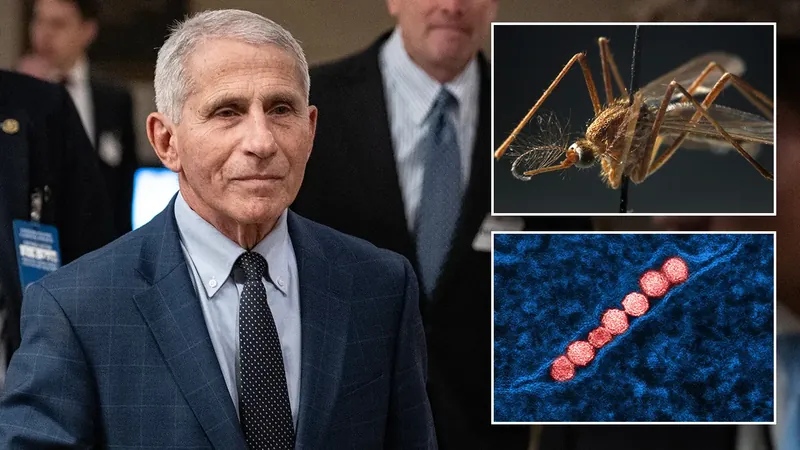
Dr. Anthony Fauci Shares His Harrowing Encounter with West Nile Virus: "I Was Afraid I'd Never Recover"
2024-10-09
Author: Yan
In a candid op-ed for The New York Times, Dr. Anthony Fauci, renowned for his leadership during the U.S. coronavirus pandemic, revealed the terrifying ordeal he faced when contracting the West Nile Virus (WNV) in August.
At 83, Fauci disclosed that he likely acquired the virus from a mosquito bite while outdoors at his home in Washington, D.C.
Initially attributing his symptoms to lingering effects of COVID-19, Fauci soon found himself in a precarious situation—a bizarre escalation led to him becoming delirious and incoherent, battling a high fever of 103 degrees.
This shocking decline in health resulted in a six-day hospitalization, where Fauci confronted the very real threat posed by WNV.
Describing the experience as “harrowing,” Fauci spoke openly about his panic over cognitive issues during his illness.
“I was disoriented, unable to remember certain words,” he expressed, highlighting his fear and profound uncertainty about whether he would ever return to full health.
Fortunately, Fauci has since made a full recovery.
He now walks several miles daily and feels a renewed sense of normalcy.
However, the experience left its mark, prompting him to use his platform to raise awareness about West Nile Virus and the need for increased resources to combat its effects.
“For many people, West Nile can have devastating and permanent consequences,” he warned.
West Nile Virus: The Rising Threat in the United States
As of October 8, the CDC reported 976 cases of West Nile Virus across 46 states, with a staggering 684 classified as severe neuroinvasive cases.
This mosquito-borne virus first emerged in the U.S. in 1999 and has since become the leading cause of mosquito-transmitted diseases in the country.
West Nile is primarily spread by Culex mosquitoes, which bite infected birds before transmitting the virus to humans.
It’s crucial to note that the virus is not spread through contact with infected animals or person-to-person transmission.
Approximately 80% of those who contract WNV experience no symptoms, but for others, the results can be severe.
While the threat appears manageable for most, certain high-risk populations—including those over 60 or individuals with underlying health conditions—face a grim reality.
Serious complications, such as encephalitis and meningitis, can occur in about 1 in 150 cases, potentially leading to death in roughly 10% of these severe instances.
Prevention Strategies: Protecting Yourself and Your Community
Currently, there is no vaccine for West Nile Virus, making prevention measures essential.
Dr. Marc Siegel, clinical professor of medicine at NYU Langone Medical Center, emphasized the importance of proactive steps: utilize insect repellents containing DEET, wear long-sleeved clothing, and eliminate standing water to curb mosquito breeding.
As the colder months approach, it’s vital to remember that mosquito activity doesn’t completely cease in fall.
Engaging in preventive practices can significantly reduce your risk of infection.
Fauci’s story not only highlights the personal toll of the virus but also serves as a stark reminder of the broader public health challenge posed by West Nile Virus.
Awareness and preparedness remain our best defenses against this invisible threat.



 Brasil (PT)
Brasil (PT)
 Canada (EN)
Canada (EN)
 Chile (ES)
Chile (ES)
 España (ES)
España (ES)
 France (FR)
France (FR)
 Hong Kong (EN)
Hong Kong (EN)
 Italia (IT)
Italia (IT)
 日本 (JA)
日本 (JA)
 Magyarország (HU)
Magyarország (HU)
 Norge (NO)
Norge (NO)
 Polska (PL)
Polska (PL)
 Schweiz (DE)
Schweiz (DE)
 Singapore (EN)
Singapore (EN)
 Sverige (SV)
Sverige (SV)
 Suomi (FI)
Suomi (FI)
 Türkiye (TR)
Türkiye (TR)